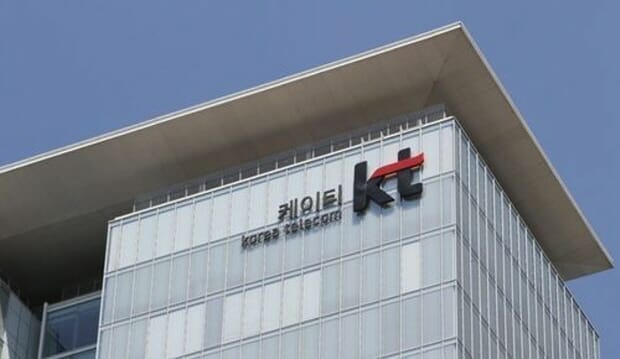
KT recorded good performance in the telecommunications sector, including the B2B business. It led to the expansion of 5G subscribers and the overall earnings growth of the media business, and the AI and digital conversion business showed full-scale growth. However, it could not prevent the card and rental business sluggish due to the corona 19 effect.
KT announced on the 9th that it recorded 23,9167 billion won in sales, 1.18 trillion won in operating profit, and 73.4 billion won in net profit last year.
Sales declined 1.7% year-on-year, but operating income and net income increased by 2.1% and 5.6%, respectively.
Separately, sales amounted to 17.87 trillion won, operating income of 15,828 billion won, and net income of 66.55 billion won. Sales declined 1.8%, but operating income and net income increased 17.4% and 55.3%, respectively.
Separate basis sales decreased due to the decrease in terminal sales, but service sales exceeded 15 trillion won.
Separate-based earnings are outperforming the consolidated basis due to the decline in the group’s earnings contribution. In other words, it is an explanation that the main body business of KT has grown remarkably.
■ Leading 5G…Stable growth in wired and wireless communication business
The telecommunications business, the main business area, continued to grow steadily last year based on 5G and IPTV.
Last year, wireless sales amounted to 6,933.8 billion won. With the full-scale expansion of 5G subscribers, the company recorded annual sales growth of 1.3%.
The number of 5G subscribers was 3617,000 as of the end of last year, the highest net increase among the three telecom companies. The proportion of 5G subscribers is 25%, slightly ahead of SK Telecom and LG Uplus. The increase in 5G subscribers is the number one contributor to KT’s operating profit on a separate basis.
The fixed-line phone business recorded sales of 1.46 trillion won, down 7.3% from the previous year. This is the effect of the continued decline of PSTN subscribers. As of the end of the fourth quarter of last year, the number of PSTN subscribers is expected to decrease to 149,000, down below 10 million by the end of this year. The number of Internet telephony (VoIP) subscribers remained at the previous year’s level at 3134,000 during the same period.
The annual sales of high-speed Internet were 2 trillion 1.2 billion won, a slight decrease from the previous year. The number of high-speed Internet subscribers is 9.71 million, of which 64.1% of them are Giga Internet subscribers. The decline in sales despite subscriber growth is attributed to the reinforcement of marketing for subscribers who have expired.
The IPTV business continued to grow. Annual sales increased by 7.7% compared to the previous year to KRW 1,723.2 billion. The number of subscribers showed a steadily increasing trend to 8763,000. Like its competitors who have completed the merger and acquisition process, KT is also expected to see a greater growth in the KT Group media business once the year-end merger process is completed.

■ Double-digit growth of AI DX platform business
The platform business that KT selected as a growth business, such as AI and DX, showed remarkable growth.
The total annual sales of the B2B business was 2.77 trillion won, an increase of 2.0% from the previous year. The corporate line and corporate IT/solution divisions maintained similar levels from the previous year, while the AI/DX division led double-digit growth.
The annual sales of the AI/DX sector such as IDC, Cloud, Bizmeka, AI platform, blockchain, and mobility were KRW 450.7 billion, recording an annual growth of 11.8%. KT explained that AI/DX sales have been growing at an annual average of 15.1% since 2017.
Last year, the growth of IDC and the cloud business is remarkable. Yongsan IDC has surpassed 70% of the reservation rate, and cloud customers have increased, mainly from public institutions and financial institutions.
In addition, it is remarkable that block chain sales have grown nearly 7 times compared to 2019 as the issuance of local currency by local governments to strengthen local commercial districts increased after Corona 19.
Sales of corporate lines and corporate IT solutions are KRW 1.68 trillion and KRW 1.154.7 billion, respectively.
■ Media content subsidiary in Shenzhen… Card real estate subsidiary is sluggish
BC Card, which has the largest earnings among consolidated subsidiaries, showed sluggish performance. The corona 19 impact was greatly affected. Annual sales were KRW 3.38 trillion, down 4.2% from the previous year.
In addition, KT Estate, which is highly affected by Corona 19 due to the real estate business, sharply dropped 24.9% from the previous year to 366.4 billion won in annual sales.
On the other hand, KT Skylife, a satellite broadcasting subsidiary, recorded annual sales of KRW 6987 billion, an increase of 0.6% from the previous year.
Music distribution, T-commerce. The sales of content subsidiaries, such as web novels, reached 720 billion won, a yearly growth of 9.6%.
KT plans to promote AI, big data, and cloud competitiveness to transform into a digital platform company. The group companies are also planning to continue restructuring to secure digital competitiveness.
Related Articles

KT acquired’ISO 45001′ certification in the enterprise sector

[1보] KT, last year’s operating profit of KRW 1.18 trillion … 2.1% ↑

KT season, original content’Wayvision Season 2’released on the 22nd

Former Vice President of KT DS as the new CEO of KT Telecop Ji-ho Jang
Dividend policy was strengthened as net profit increased. The dividend per share was decided at 1,350 won, an increase from the previous year. It is expected to be confirmed through a general shareholders’ meeting in March.
KT Finance Director Kim Young-jin said, “By 2021, we will become a company that grows in a differentiated way through the expansion of the digital platform business and bold business portfolio conversion.” I will try to improve.”
